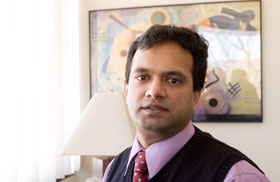  |
| HOME | THIS ISSUE | CALENDAR | GRANTS | BACK ISSUES | < BACK | NEXT > |
Health Center clinic studies, treats fatigue caused by cancer therapyby Kristina Goodnough - February 27, 2006 |
||||
|
A new clinic at the Health Center’s Neag Comprehensive Cancer Center offers treatment and support for the debilitating fatigue that affects many patients undergoing treatment for cancer. “Many patients receiving treatment for cancer are seriously affected by fatigue,” says Dr. Jayesh Kamath, an assistant professor of psychiatry, who established the clinic for cancer fatigue and is conducting research into its possible causes and treatments. “It can cause patients to quit their jobs or retreat from social activities and seriously disrupt their lives,” Kamath says. “And there is a correlation between persistent fatigue and poor prognosis.” Unfortunately, he adds, many patients believe there is little that can be done about the condition. Serious fatigue in cancer patients is sometimes related to anemia, thyroid problems, or electrolyte disturbances, all of which can be treated medically with generally good results, he says. “Fatigue in some cases can also be related to depression and anxiety. Treating the symptoms with medications and with individual or group therapy can benefit the patients.” One patient in the clinic had been so troubled by fatigue that she was unable to return to work full time for more than a year after successful treatment for breast cancer. “She was a college professor and could return to work only part time,” says Kamath. After treatment at the clinic, she has returned to work full time and says she wishes she had known about the clinic a year ago. “We weren’t here a year ago, but it is very gratifying to see her get her life back,” says Kamath.
For those patients for whom there is no identifiable, reversible cause of the fatigue, Kamath and his colleagues in the psychiatry department are studying new treatments, such as a hormone produced by the body that is believed to increase energy levels. The researchers are starting a small clinical trial to examine its effect on fatigue in breast cancer patients. They also plan to study a small group of breast cancer patients to see if their fatigue is related to immune system dysfunction. The fatigue clinic is supported by a gift from the Charlotte Johnson Hollfelder Foundation, which was established by Fred Hollfelder in honor of his wife, who survived breast cancer and died of an unrelated illness. “Support for the fatigue clinic is a way to honor my wife’s memory,” says Hollfelder. “She suffered from fatigue during her cancer treatment and I felt helpless. She would be delighted to know I was trying to do something for others.” Patients interested in the cancer fatigue clinic can get more information by calling the Carole and Ray Neag Comprehensive Cancer Center at 860-679-2100. For information about participating in clinical trials, call 877-252-2225. |
| ADVANCE HOME UCONN HOME |

